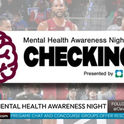Staying Up Late May Be Doing More Harm Than You Think, Cleveland Clinic and Harvard Experts Warn
- Lauren Portier

- May 1, 2025
- 3 min read
WCTU CLEVELAND 13 — As May marks Better Sleep Month, new findings from the Cleveland Clinic and Harvard Medical School are spotlighting the hidden health risks night owls may face, even when sleep duration appears sufficient.
“We live in a sleep-deprived society with about 40% of adult Americans getting inadequate sleep,” said Dr. Nancy Foldvary, a sleep specialist with the Cleveland Clinic. “Night owls are particularly at risk for chronic sleep deprivation, and that puts our bodies and every organ system, our brains, at risk for health problems.”
According to Dr. Foldvary, those who naturally stay up late often struggle to get the rest they need because their sleep timing does not align with societal norms. Over time, this misalignment can contribute to a range of health conditions, including depression, high blood pressure, and type 2 diabetes. Common behaviors such as using phones or watching TV before bed can further delay sleep, potentially indicating an underlying condition like Delayed Sleep Phase Syndrome. “This is a disorder where sleep timing is delayed. It's impossible for people to fall asleep at the normal time, and so they're sleeping two to four hours later than that,” she said.
A large-scale genomic study led by Harvard-affiliated Massachusetts General Hospital and the University of Exeter also confirms the risks night owls may encounter. Published in Nature Communications, the study analyzed genetic data from nearly 700,000 participants and found that those genetically inclined to be early risers reported higher mental well-being and lower risks for depression and schizophrenia. Although it did not find strong links to obesity or diabetes, the study significantly expanded the number of known genetic markers associated with sleep timing, from 24 to 351.
“The large number of people in our study means we have provided the strongest evidence to date that ‘night owls’ are at higher risk of mental health problems,” said Michael Weedon of the University of Exeter Medical School.
Complementing these findings, a 2023 Harvard-led study tracking 64,000 women over eight years found that self-identified night owls were 72% more likely to develop diabetes compared to morning larks. Even after adjusting for lifestyle factors such as diet and exercise, night owls still showed a 19% increased risk. Another study involving nearly 137,000 adults found that those with bedtimes past 10 p.m. were significantly more likely to be obese or have large waistlines. These individuals also tended to get less sleep overall.
Dr. Kenneth Sassower, a sleep neurologist at Harvard-affiliated Massachusetts General Hospital, highlighted the biological importance of sleep timing. “We sleep best, with the highest-quality sleep, when the sun is down. That’s just how we’re wired,” he said, noting that late bedtimes limit the hours available for restorative sleep in darkness.
Harvard Health recommends a gradual shift for those attempting to adjust their sleep schedule. Sleep experts advise rolling back bedtime by 20 minutes every five days and maintaining a consistent wake time, ideally no later than 9 a.m. Melatonin or prescription alternatives like ramelteon may also aid in realigning circadian rhythms. Patience is key, as establishing a new sleep pattern can take up to 90 days.
Dr. Foldvary emphasized the importance of speaking to a physician about chronic sleep problems. “It’s crucial to bring up any long-term sleep problems to your doctor,” she said.
-----------------
At Cleveland 13 News, we strive to provide accurate, up-to-date, and reliable reporting. If you spot an error, omission, or have information that may need updating, please email us at tips@cleveland13news.com. As a community-driven news network, we appreciate the help of our readers in ensuring the integrity of our reporting.


























































Comments